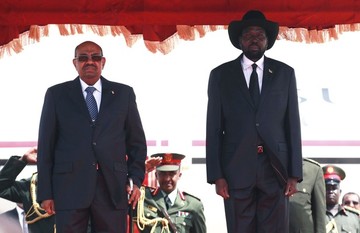South Sudan’s Kiir says Khartoum using pipeline as “weapon of threat”
June 17, 2013 (JUBA) – South Sudan president Salva Kiir has strongly dismissed allegations that his country supports rebels opposed to Khartoum saying the latter was using its oil pipeline to threaten the sovereignty of the new nation.

At the meeting, which was aired on the state-owned SSTV, were ambassadors from the European Union, Britain and the African Union.
“The accusations by the government of Sudan that we support rebels fighting them are not correct. We have said this over and over again that we do not [have] facilities to provide any support to any armed groups fighting the Sudanese government,” Kiir told the diplomats.
He said South Sudan, being new nation, is still striving to meet the demands of its people, but remains committed to ensure that peace prevails in Sudan.
“We need the Sudanese people to live in peace. This is why we have saying the problem in Sudan needs peaceful dialogue,” Kiir stressed.
Last Tuesday, the Sudanese government sent two letters, informing South Sudan of its decision to suspend economic agreements and the use of its territory to export crude oil to the international markets.
The letters, signed by Sudan’s oil minister, Awad Al-Jazz indicates 9 June as the effective date for starting the shutdown process.
But Kiir said Sudan should not to use the shutdown of oil as a weapon to threaten his country, pointing out that the Sudanese rebels have a case which requires peaceful dialogue instead of war.
The South Sudanese leader instead urged his Sudanese counterpart, Omer Hassan al-Bashir Kiir to embark on a peaceful approach to the conflict, so that concerned parties can reach a comprehensive agreement.
He specifically called on Bashir to utilise the mechanisms provided in the September 2012 cooperation agreements, to peacefully resolve disputes through African Union High Level Implementation Panel (AUHIP).
The landlocked South, which has to use Sudan’s pipelines and port facilities to sell its crude, has piped around 7 million barrels of crude to its neighbor since resuming production in April.
South Sudan used to pump 300,000 bpd before it turned off wells last year in a row with Sudan over fees.
In late April, Sudan Revolutionary Front (SRF) rebels, who aim to topple the Bashir regimetook control of Abu-Kershola in South Kordofan as part of a wide offensive that saw them briefly occupying North Kordofan second largest town of Um Rawaba.
The attack was significant given the fact that rebel activity has been mostly limited to the states of Darfur, Blue Nile and South Kordofan. Residents said that the rebels were met with little resistance from government forces there.
The Sudanese government claimed that Juba provided the funding and support to this military offensive.
Meanwhile, the South Sudanese embassy in Washington issued a statement reiterating that its government does not provide any support to Sudanese insurgents.
“The accusations by the government of Sudan that the government of the republic of South Sudan provides support to their own rebels group fighting in Sudan are baseless and is an attempt by to backtrack and obstruct the implementation of the September 27th Cooperation Agreements between the two countries and particularly the Abyei Referendum in 0ctober 2013”, partly reads the statement extended to Sudan Tribune.
The embassy, in the statement, also accused the Khartoum establishment of supporting rebel groups within the territory of South Sudan, with the aim of destabilizing the country.
“This is evidenced by the recent activities of David Yau Yau in Jongeli state, who is still supplied weapons and logistical support by Khartoum,” it said.
Rebels who recently responded to Kiir’s amnesty calls claimed they received support from Khartoum to fight the new nation, a revelation which seems to back earlier claims from the south.
“The admission and testimony of rebel leaders such as Johnson Uliny, Bapiny Monytuil and other rebels is further evidence that Khartoum is supporting rebels who are fighting a proxy war against the government of South Sudan,” the statement noted.
The weapons they brought along with them could not be obtained by these groups except with the help of Sudan as they confirmed, it added.
The Sudanese government has, however, remained silent over the rebel claims, almost three weeks after they responded to the amnesty call.
(ST)
